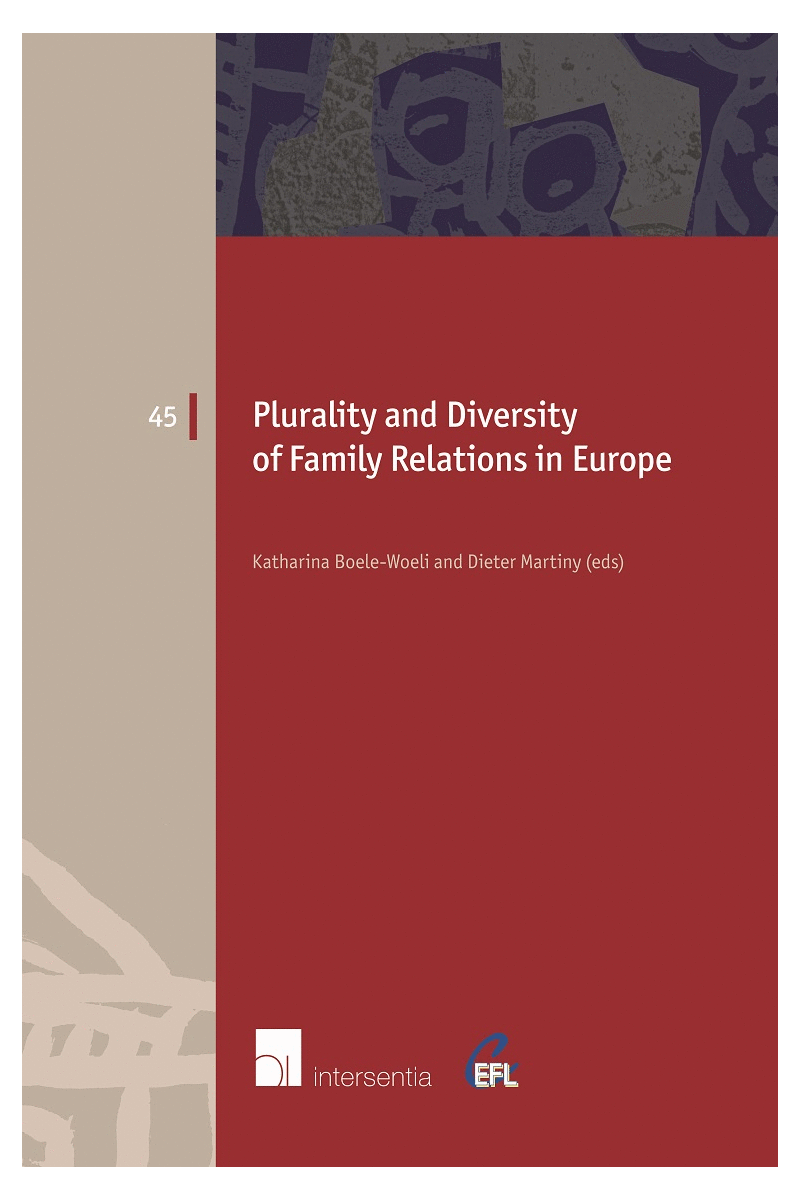 maestro
mastercard
visa
maestro
mastercard
visa

Plurality and Diversity of Family Relations in Europe

This volume contains the contributions delivered at CEFL’s sixth international conference, which focused on comparative and international family law in Europe in their respective cultural contexts. Inter alia in this book CEFL experts and other legal scholars address the CEFL and its Principles, the interrelation of family law and family sociology, family migration, children’s and women’s fundamental rights, as well as the developing concept of parenthood, the role of children in family proceedings, extra-judicial divorces and ADR in family matters.
While the development of modern trends in European family law is going on, some new challenges arise and old challenges remain. The awareness of more plurality and diversity in family relationships is increasing. Both pose problems. New legal solutions have to be integrated into the existing family law system. On the other hand, there are tensions between modern fundamental values and traditional religious solutions. For both a deeper analysis is necessary.
The conference, and in turn the book, aims to enhance the exchange of ideas and arguments on comparative and international family law in Europe.
| Type of product | Book |
|---|---|
| Format | Paperback |
| EAN / ISSN | 9781780688176 / 9781780689111 |
| Series name | European Family Law |
| Weight | 645 g |
| Status | Available |
| Number of pages | xii + 388 p. |
| Access to exercice | No |
| Publisher | Intersentia |
| Language | English |
| Publication Date | Aug 29, 2019 |
| Available on Strada Belgique | No |
| Available on Strada Europe | No |
| Available on Strada Luxembourg | No |
Downloads
- Table of contents and preliminary matter
- THE CEFL AND ITS PRINCIPLES
- The Commission on European Family Law: Taking Stock after Almost 20 Years
Katharina Boele-Woelki - The Principles of European Family Law Regarding the Property,Maintenance and Succession Rights of Couples in De Facto Unions: A First Glimpse
Cristina González Beilfuss, Dieter Martiny, Nigel Lowe, Katharina Boele-Woelki - FAMILY MIGRATION, CHILDREN’S AND WOMEN’S RIGHTS
- Respecting Children’s Dignity under Private International and Migration Law
Hans van Loon - Empowering Women in Family Relations
Maarit Jänterä-Jareborg - The Paradox of Rights Through the Lens of Muslim Women’s Rights in Family Law
Shaheen Sardar Ali - THE DEVELOPING CONCEPTS OF PARENTHOOD
- The Concept of Parenthood in the Case Law of the European Court of Human Rights
Dafni Lima - Family Frontiers: The Definition of Parenthood in Brazil and in Portugal
Marianna Chaves - Donor Conception: From Anonymity to Openness
Elodie Decorte - THE ROLE OF THE CHILD IN FAMILY PROCEEDINGS
- Balancing the Rights of Parent and Child in Case of Non-Compliance with Contact Arrangements: A Case Law Analysis
Eva Vertommen - The Public Law Aspects of the Brussels IIbis Regulation Through an Irish Lens
Maria Corbett - The Right of the Child to be Heard in Parental Responsibility Proceedings
Jessica Delgado Saez - Maturity and the Child’s Right to be Heard in Family Law Proceedings: Article 12 UNCRC and Case Law of the ECtHR Compared
Charlotte Mol - EXTRA-JUDICIAL DIVORCES AND ADR IN FAMILY MATTERS
- The Recognition of Religious Private Divorces in Europe: From Conflict of Laws to Conflict of Cultures?
Katharina Kaesling - Extra-Judicial Muslim Divorces and Family Mediation in the Nordic Countries: What Role is there for the Welfare State?
Sanna Mustasaari - Family Law Arbitration: A Comparative Analysis of German and English Law and Practice
Saskia Zellerhof - Mandatory Mediation from a European and Comparative Law Perspective
Céline Jaspers - INTERDISCIPLINARY RESEARCH INTO FAMILY RELATIONS
- Family Sociology and Family Law: What can the One Learn from the Other?
Dimitri Mortelmans